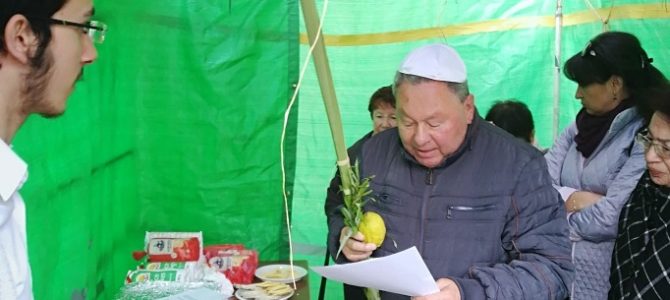
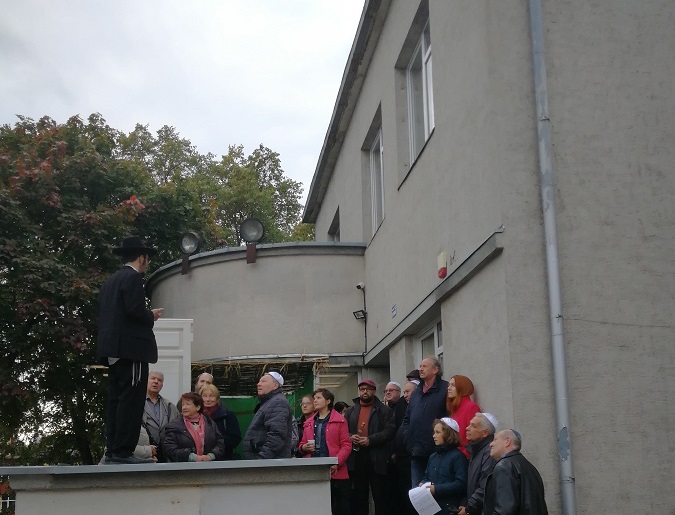


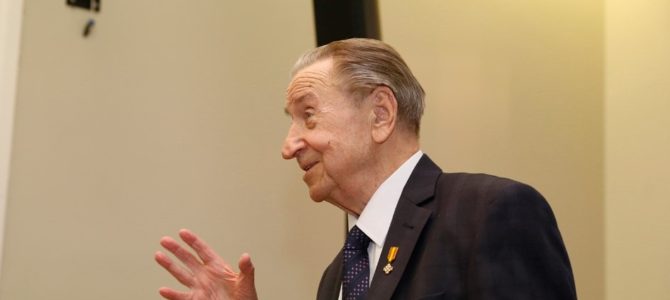
Maestro Eugejijus Paulauskas whose 90th birthday we celebrated one year ago in the Jashca Heifetz Hall at the Lithuanian Jewish Community has passed away. He shared his memories with us then and we want to share some of ours about him as well. Paulauskas was a violin virtuoso and a wonderful teacher. The Lithuanian Jewish Community sends sincere condolences to his family for their loss.
Born September 6, 1927, Paulauskas began his musical career more than 70 years ago. The talented musician went on to become one of Lithuania’s most notable violinists. He began studying music in Šiauliai and completed violin class under professor J. Targonskis at the Vilnius Conservatory in 1949. Last year at the birthday celebration Eugenijus Paulauskas said: “My teachers were very good, all of them were Jewish. After all, the best violinists in the world are Jews because this is a talented people. Chamber music is one of the subtlest, most profound and most intellectual forms of music and performance. I am convinced no other genre of music has so many pearls, so many masterpieces, as the quartet does. All the musical geniuses compose quartets. These compositions are made in such a way that as you perform them you forget the musical fabric, the architectonics of form, because you enter into the very depths of emotion from which emerge as if cleansed, enlightened. This sort of rebirth isn’t something just we musicians need. Everyone who comes to a concert needs it,” the master violinist said.
Paulauskas’s solo concert activity was greatly limited by his deep engagement with the Lithuanian Quartet and his pedagogical work, which have become an important part of his activities. He had innate talent, the characteristics of a solo virtuoso which was developed very early, passion to perform and passion for communicating with people of all ages and experience in his audience. Paulauskas’s rich solo repertoire was dominated by music from the Baroque, classical and romantic ages. His performance on the violin was exquisite and full of style, and his duets were subtle. His violin duets with piano met with great approval from audiences and critical acclaim.
Rest in peace, Eugenijus Paulauskas, beloved and respected by all.
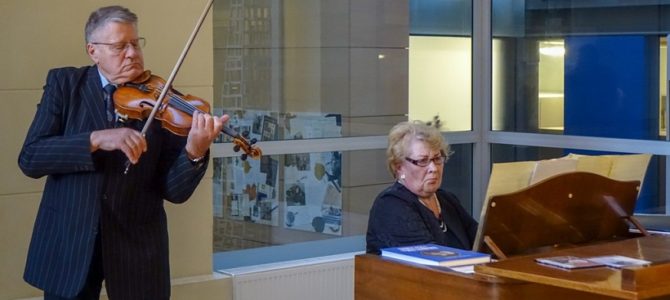
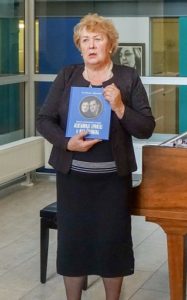
Professor Rita Aleknaitė-Bieliauskienė, formerly a resident of Panevėžys, invited the Panevėžys Jewish Community to attend an event to present her book “Iškilūs XX a. Lietuvos atlikėjai ir pedagogai Aleksandras Livontas ir Olga Šteinberg” [“Notable 20th Century Performers and Teachers Aleksandras Livontas iand Olga Šteinberg”], a screening of the documentary films “Žmogus su laiko žyme” [“Person Marked by Time”] and “Dainos galia” [“The Power of Song”] and a discussion of other remarkable 20th century performers and teachers. The professor’s book has real historical value, presenting the cultural inheritance and the past through contemporary eyes to readers. Not everyone is able to do this, but Rita Aleknaitė-Bieliauskienė has succeeded, as she always does. Panevėžys poet Elvyra Pažemeckaitė helped organize this cultural event.
It’s impossible to picture Lithuanian cultural life and the Lithuanian past without the Jewish contribution to cultural evolution. In her book the professor describes longevity in the words of the writer Grigory Kanovitch: the development of the individual begins with the number of books he’s read.
Leonas Balevičius, a member of the Union of Former Ghetto and Concentration Camp Prisoners, passed away October 1. We have lost an honest, good and just man who knew how to sympathize, to give advice and to help. Our deepest condolences to his daughters Giedrė and Rūta, son Saulius and beloved grandson Leonas.
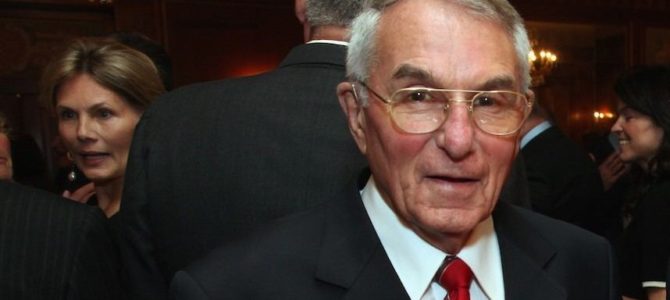

Kaunas ghetto inmate, legendary Litvak and US military officer major general Sidney Shachnow has passed away. He was born in 1934.
He survived the Holocaust in Lithuania and went on to become a legendary member of US military special forces. After spending three years in the ghetto, he escaped and later resettled in the United States.
His military career there was impressive. He did two tours in Viet Nam and served as a highest-ranking US military officer in West Berlin as the Cold War was grinding to a halt. US Special Forces, the Green Berets, are said to venerate Shachnow to the point of hero worship. He retired in 1994. He passed away at the age of 83 on Friday, September 28. His autobiography is called Hope and Honor.
More information in Lithuanian available here.
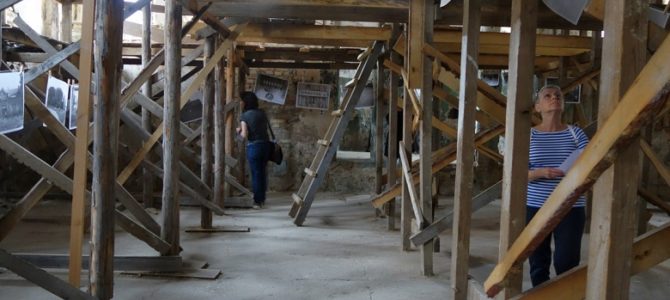
by Agnė Narušytė
Two photography exhibits which don’t exist provoked me to write this article. One was supposed to open next week, but will not, and the other ran for just one day in a synagogue full of construction platforms. Neither artist was born in Lithuania but they live here now. Both exhibits concerned ethnic groups who were victims of the Holocaust: Jews and Roma.
British photo-journalist Richard Schoefeld came to Vilnius in 2001 and lived there until 2013 when he moved to Kaunas to work on a project connected with Litvaks. Since then Litvak culture has been his main theme. In 2015 he established the International Centre for Litvak Photography, an NGO which seeks to make Jewish history and culture topical and especially for young people to learn about Litvak culture using photography, art installations, workshops and other means. For several years now he has been trying to convince the intellectuals and government of Kaunas of the need to restore the Šančiai synagogue which is falling into ruin. He hasn’t succeeded.
So then Schofield drew up a list of about one hundred Lithuanian synagogues and set for himself the task of visiting each one. He hitchhiked for 12 days, kept a diary and used his mobile phone to record some of the people he met and the surviving and ruined synagogues. Only a very few had any signs of restoration work: bags of cement, bricks, tools. Many are simply falling down, although they are protected by the Lithuanian state as “monuments of great cultural, historical and architectural value.” As an example, the entry in his diary about the synagogue in Žemaičių Naumiestis reads: “Trees and bushes are growing in the middle of the building. Rays of sunlight shine through holes in the roof. Someone needed some flooring so they just stole it.”
The Destinies series of events invites you to come mark the 90th birthdays of the late Simonas Alperavičius and the maestro Saulius Sondeckis.
Program:
Discussions and recollections
Piano trip Musica Camerata Baltica
Screening of film “Aš kažkaip laimingas” (“I’m Happy Somehow,” 2014) by Berznitski and Gintarė Zakarauskaitė
Special television program “Svyatoslaw Belza Interviews Saulius Sondeckis”
6:00 P.M., October 18, Jascha Heifetz Hall, Lithuanian Jewish Community, Pylimo street no. 4, Vilnius
Initiated and moderated by Maša Grodnikienė
We will visit the graves of Saulius Sondeckis and Simonas Alperavičius, Z”L, in the morning on October 11.
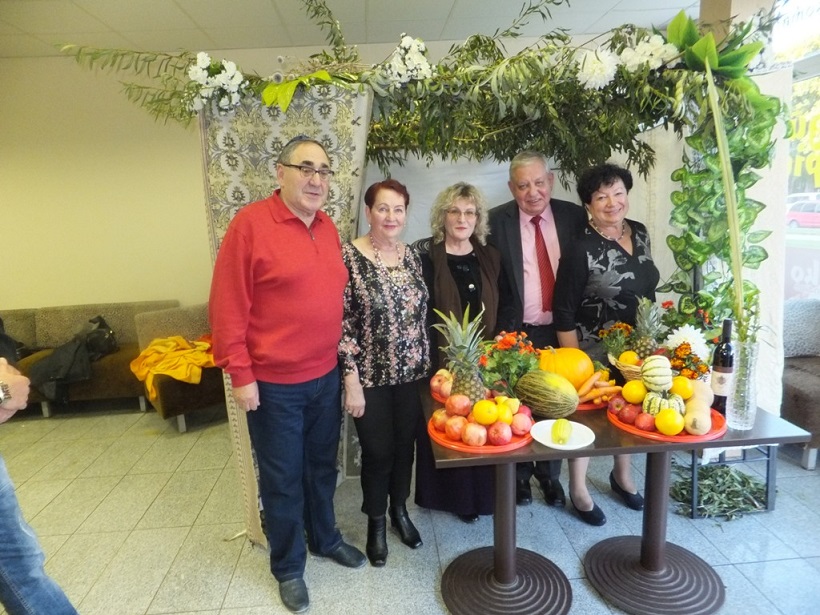
This year the Panevėžys Jewish Community and the Šiauliai Regional Jewish Community celebrated Sukkot together. According to tradition, during Sukkot, the Feast of Tabernacles (or more simply “tents”), everyone sets up a sukka, a booth or tent, together in which the ancient holiday associated with the annual harvest is celebrated. It recalls the sojourn of the Jews in Sinai when the people lived in tents. The usual practice is to make a sukka according to one’s means. This year in Panevėžys a buffet table stood next to the sukka featuring fruit and vegetables grown by community members. The main feature of the Sukkot table is the four species, the lulav, hadas, aravah and etrog, bound in palm fronds.
Panevėžys Jewish Community chairman Gennady Kofman said Sukkot is a continuation of the Jewish high holidays Rosh Hashanah and Yom Kippur.
Many of the older participants spoke about how their families used to celebrate Sukkot when they were children. They used to make the sukka out of green wicker and put the table next to the sukka, where the whole family sat. The children received gifts rare at the time: bananas, oranges and tangerines. They also recalled the times of difficulty for the Jewish people when they wandered in the deserts of Sinai.
The Lithuanian Jewish Community expresses deep condolences to the family of Gintautas Kirkilovskis on his loss. The family living in Riešė only recently joined the Vilnius Regional Jewish Community. We are deeply saddened by his loss.
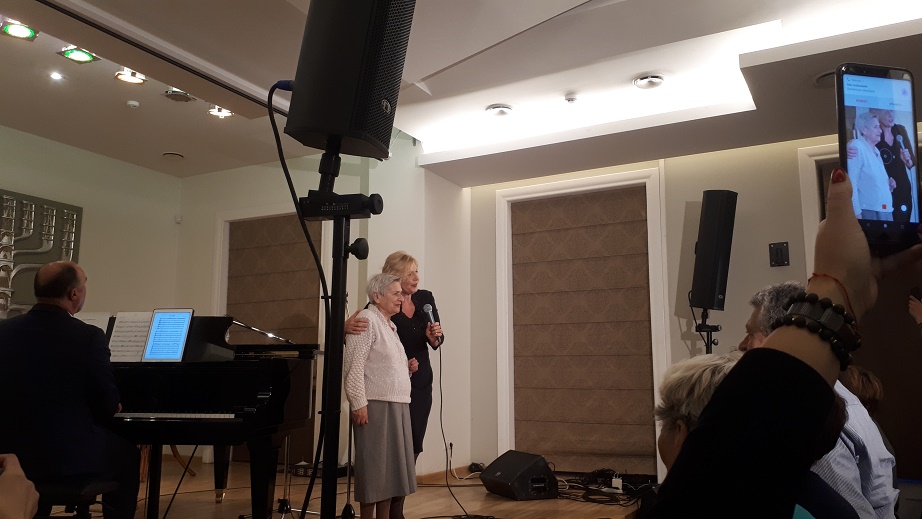
Maria Krupoves performed Vilnius ghetto songs in Yiddish accompanied on piano by Artūras Anusauskas at the Jascha Heifetz Hall at the Lithuanian Jewish Community September 27. Krupoves holds a PhD and is a scholar and folklorist as well as an outstanding musician. A polyglot, her repertoire include songs from across Central and Eastern Europe sung in Yiddish, Polish, Lithuanian, Belarusian, Romani, Karaïte, Tartar and a number of other languages. Her performance this time included the songs Es is geven a sumer-tog; Vilne, Vilne, undzer heymshtot; Unter dayne vayse shtern; Zog nit keynmol and others.
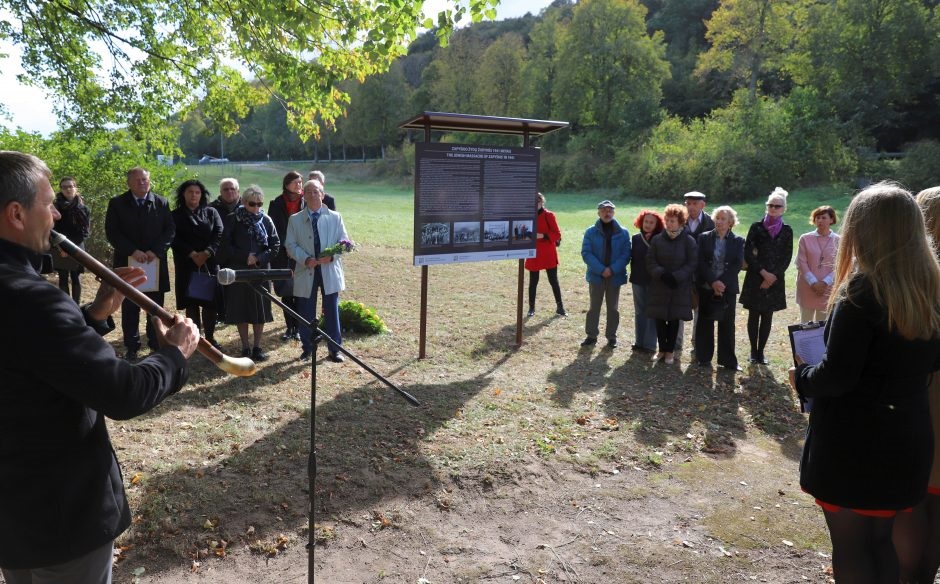
The Kaunas administration and the Center for the Study of the Genocide and Resistance of Residents of Lithuania have placed information stands at two sites in the village of Zapyškis.
Zapyškis in 1923 had a population of 589, over half of them Jewish. The center of the community’s cultural life was the Zapyškis synagogue and there was the Bal-Makhshov cultural association, a library, pharmacy, several shops and a Jewish primary school.
Full story in Lithuanian here.
Moišė Tarnaride passed away September 28. He was born in 1937. Our deepest condolences to his son Leonidas and daughter Jevgenija.
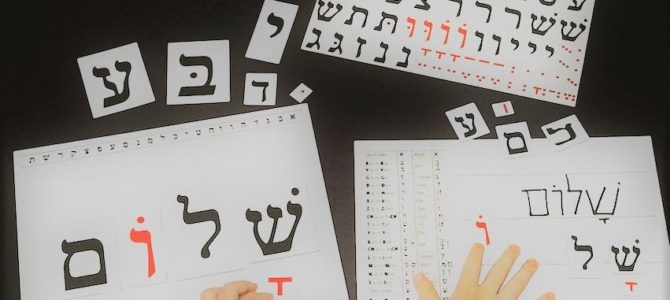
Everyone is invited to come learn some Hebrew or improve the Hebrew skills they already have. On Sundays the long-awaited lessons for children will be held as well. To register contact teacher Ruth Reches by email at ruthreches@gmail.com
Sunday
9:30-11:00 A.M. Hebrew for adults, level 2 (continued, conference hall at the LJC)
1:00-2:30 P.M. Hebrew for adult beginners (conference hall)
2:45-4:15 P.M. Hebrew for adults, level 1 (continued, conference hall)
Sunday school for kids
10:00-11:00 A.M. English lessons by English teacher Viačeslav Mlynkovskij (Ilan Club)
11:15-12:00 noon Hebrew (conference hall)
12:00-12:45 P.M. Traditions (conference hall)
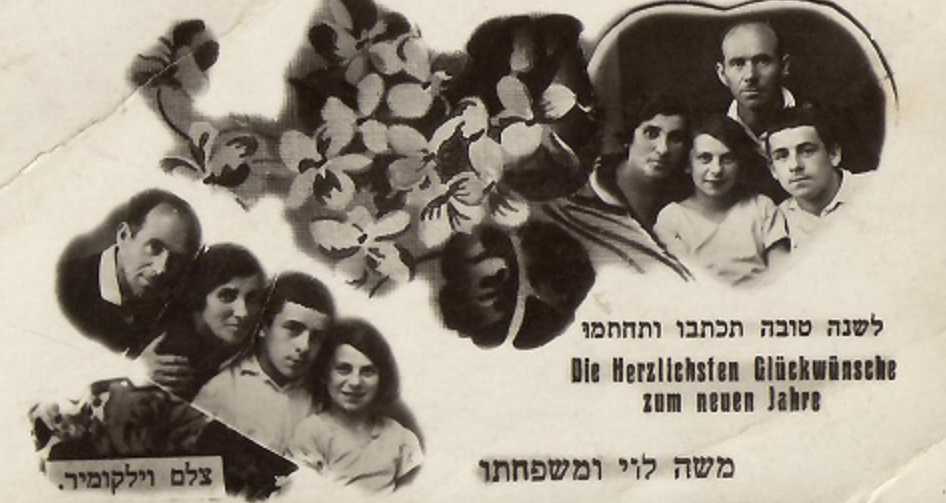
On September 24 two memory stones commemorating Holocaust victims were placed on the ground in Ukmergė (Vilkomir). The idea of memory stones is to remember victims of fascism where they lived and worked. One stone was set in the ground on Vasario 16 street near an athletics school where the Great Synagogue of Vilkomir once stood and is dedicated to Rabbi Josif Zusmanovitch. The second is at Kauno street no. 17, dedicated to the photographer Moshe Levi whose studio was located there.
Artūras Taicas, chairman of the Ukmergė Jewish Association, thanked the project organizers in the name of the entire Jewish community for remember the lost world of the Litvaks.
Vepriai primary school teachers Aldona Medonienė and Vitas Medonas, Lithuanian Human Rights Center reps Simona Gaidytė and Jūratė Juškaitė and Ukmergė Regional History Museum representative Jolanta Petraitytė also spoke at the ceremony to unveil the stones.
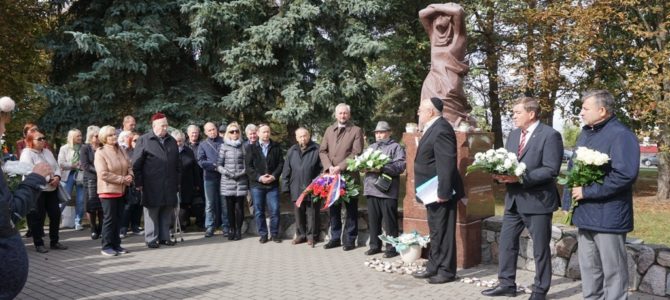
The Panevėžys Jewish Community held an event to commemorate Holocaust victims with long-term community partners the Saulėtekis gymnasium, the J. Balčikonis school, the V. Žemkalnis school, the J. Miltinis gymnasium and the M. Rimkevičaitė school of business and services.
In the first part of the event teachers and students from the schools participated in a quiz about history, Jewish culture and the Holocaust. Many displayed a deep knowledge while others heard for the first time about the ghettos in Vilnius, Kaunas, Šiauliai, Panevėžys and other towns.
Next, participants presented posters they had made on the theme of “never again.” Teachers who head tolerance centers at their schools judged the pictures full of pain and suffering.
Every school was awarded prizes, trophies, thank-you letters and souvenirs for the knowledge, initiative, creativity, tolerance, bravery and artistry they displayed. Students from the Balčikonis school won the quiz.
Exhausting legal arguments for over a year now regarding standards for representation within the Lithuanian Jewish Community have now ended, but the destructive efforts continue by the Vilnius, Klaipėda, Ukmergė and Šiauliai Regional Jewish Communities to prove that equality before the law and the rule of law are not the principles which should guide the LJC, which includes 27 organizations as members.
Disputes arose at the LJC conference held back in May of 2017 over the representation of members, disputes which, despite the LJC’s efforts to find consensus, grew into open conflict. The newly-elected leadership of the Vilnius Jewish Community wanted proportional representation at the conference, so that every associated member would have a number of votes proportional to their number of physical members, thus giving their organization a monopoly on decision-making at the LJC conference.
This sort of representation is out of line with the Lithuanian law on associations, whose article 8, part 4 says each association member has one vote at a general meeting of the association; this insures the equal rights of members of the association and their equal participation in decision-making. This is the law, the rule providing for equal voting rights among members, which the Board of Directors of the LJC followed before convening the LJC reporting and election conference.
On November 22, 2017, the Vilnius district court found LJC statute point 7.1 on proportional representation of regional communities at LJC conferences null and void for failing to adhere to Lithuanian law. LJC associate members the Vilnius Jewish Community, Klaipėda Jewish Community, Ukmergė Jewish Community and Šiauliai Regional Jewish Community sought to appeal this decision and renew hearings, but on June 12, 2018, this appeal was rejected by court decree.
The Vilnius Jewish Community, Klaipėda Jewish Community, Ukmergė Jewish Community and Šiauliai Regional Jewish Community have entered a cassation case with the Lithuanian Supreme Court to review the finding by the Vilnius district court on June 12, 2018. The Lithuanian Supreme Court, the only venue which hears cassation complaints, ruling on the application of law rather than the facts of the case, issued a finding on September 19, 2018, declining to accept the cassation complaint for a hearing, and thus again confirming the necessity of applying the rule for equality among members of an association. This finding by the court is final and cannot be appealed.
The LJC encourages members, the public and interested parties to ignore information of a mendacious nature appearing in the media and social media about the allegedly illegitimately elected leadership of the LJC and we are making every effort to insure maximum transparency in our actions. At the same time, we regret the disagreements which have taken root, which divide the community and which are dissonant with the fundamental values of our people. Despite ongoing disagreements, the LJC is open to a further search for compromise with members questioning the legitimacy of the leadership of the association.
The Nechama Lifshitz Ensemble from Israel presents a creative evening to commemorate the victims of the Holocaust called “Heroism in the Face of Destruction. Testimonies,” directed by Regina Driker. The evening is dedicated to the heroes of the Vilnius ghetto. Passages from books, photographic documentation and songs of the ghetto in Yiddish (with Lithuanian translations). Performers: Gintaras Mikalauskas (actor, Lithuania), Gali Ben-Ari (vocalist, Israel), Roza Klein-Gofanovich (vocalist, Israel), Maksim Levinski (vocalist, Israel), Ada Pashaev (vocalist, Israel), Jana Yankovski (vocalist, Israel), Gregoriy Stolovich (multi-media), Regina Driker (pianist, director, playwright).
Time: 6:30 P.M., October 4, 2018
Location: Theater Hall, Vilnius University, Universiteto street no. 3, Vilnius.
Duration: ~one hour and thirty minutes
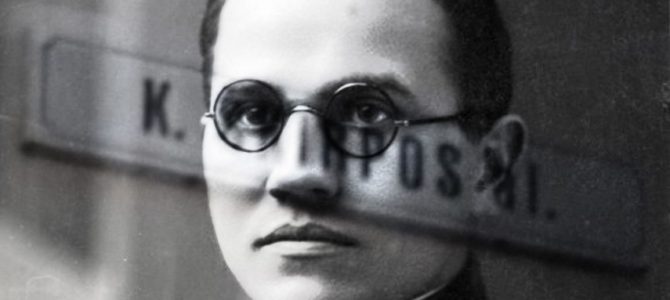
Mark Adam Harold, a member of the Vilnius city council, has sent a request and published it as an open letter to Povilas Poderskis, the director of administration for the municipality, calling for drafting and presenting to the council a measure to change the name of a controversial street in the Lithuanian capital.
Harold is calling for “Škirpos alėja,” or “Škirpa’s alley,” to be renamed “Vėliavos alėja,” or “Flag Alley.”
Kazys Škirpa, Lithuania’s military attaché to Nazi Germany, founded and led the Lithuanian Activists Front in Berlin in November, 1940. LAF cells inside Lithuania were formed and were later called upon by LAF leaders to ease the invasion of the Wehrmacht of what was then considered the western Soviet Union. LAF leaflets and missives also called for the murder of Lithuanian Jews.
On January 1, 1919, Škirpa and other Lithuanian volunteer soldiers raised the Lithuanian tricolor, the flag of the Republic of Lithuania, on top of the Tower of Gediminas on Gediminas Hill overlooking the center of Vilnius, the capital of the newly proclaimed state. Škirpa’s alley is located at the base of the same hill.
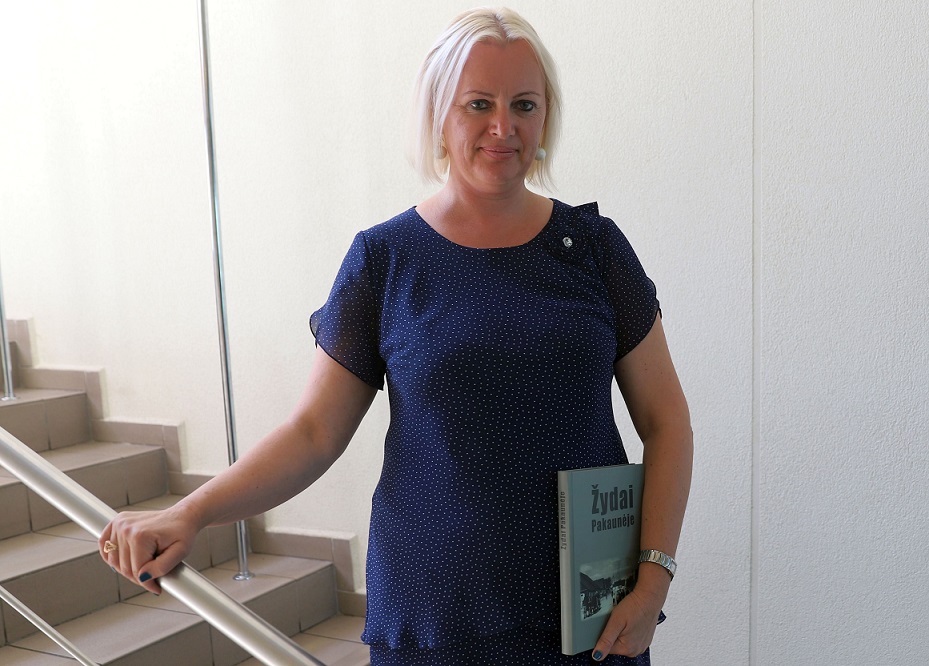
The Kaunas Regional Public Library Monday presented a new book written by multiple authors called “Žydai Pakaunėje” [Jews in the Area around Kaunas]. The collected writings were compiled by Dr. Inga Stepukonienė, a teacher at the Garliavos Jonučiai Gymnasium and associate professor at the Kaunas branch of Vilnius University.
Book authors, historians and members of the Jewish community attended the book launch.
Historical documents show Jews settled in the Grand Duchy of Lithuania in the 14th century and numbered over a quarter million people by the 18th century.
Litvaks were considered hard-working, talented and creative. Many fought in Lithuania’s volunteer army and participated actively in national life. Interwar Lithuanian and Jewish politicians, scholars and writers forged a common vision for the new nation.
The book features many recollections. Most of the authors tackling the subject of Jewish life in the villages around Kaunas are local residents. Regional historian Antanas Vaičius is from Čekiškė, Algirdas Marazas of Kulautuva writes about Jewish life there and Garliava residents Inga Stepukonienė, Robertas Keturakis and Ovidijus Jurkša pay tribute to the history of the Jews of Garliava.
Some Litvaks from the area around Kaunas even achieved world renown: Leiba and Estera Tile moved to America and became the adoptive parents of Louis Armstrong, aka the jazzman Satchmo.